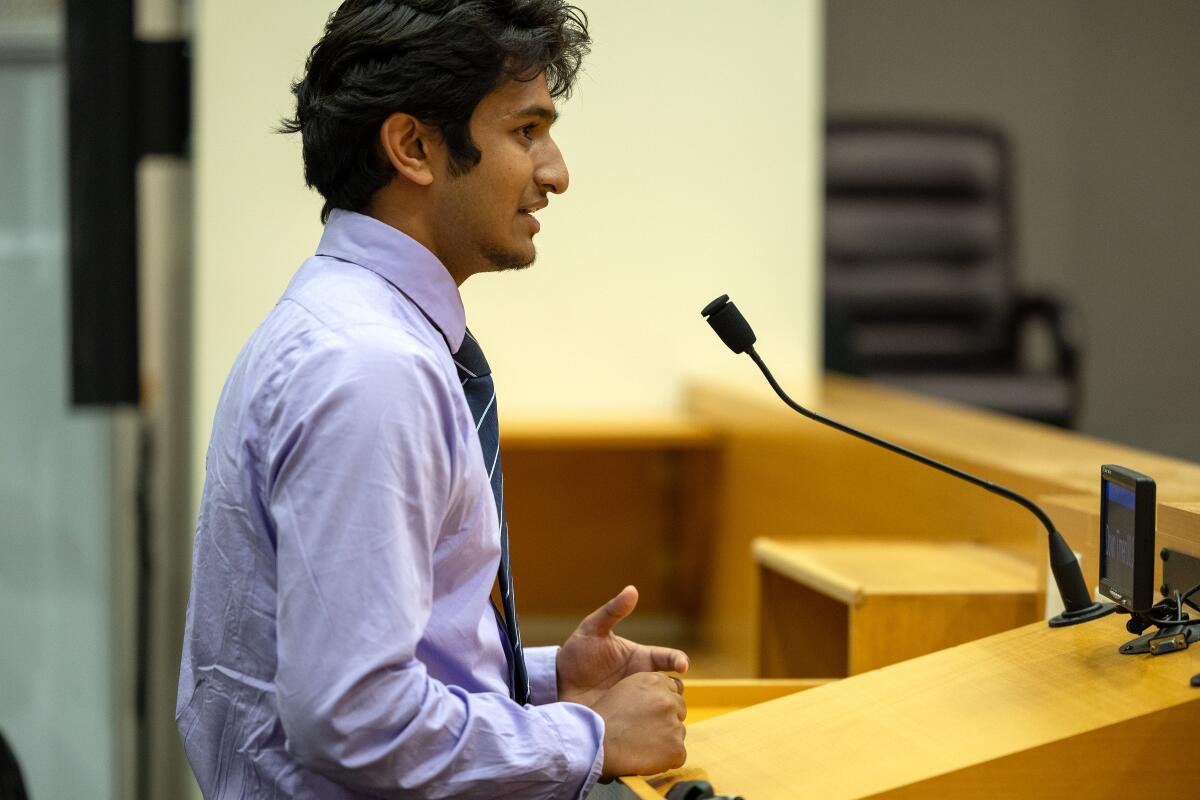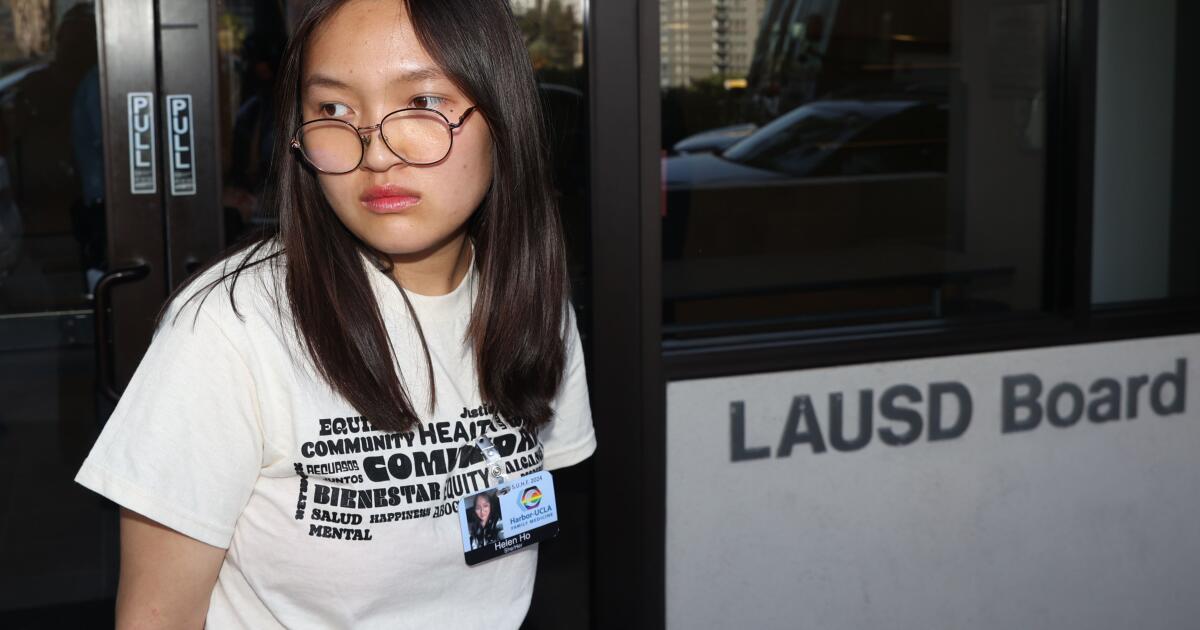Good morning, it’s Thursday, June 20th. Here’s what you need to know to start your day.
Newsletter
You are reading the Essential California Newsletter.
Our journalists bring you the biggest news, features and recommendations every morning
Please enter your e-mail address
sign up
You may receive promotional content from the Los Angeles Times.
LAUSD Approves Cell Phone Ban, But Students Demand to Be Heard
Can I bring my cell phone to school? Will it be locked in any way? Will access to social media platforms really be blocked? How can I contact my parents?
These are questions Los Angeles public school students are eager to know after the Los Angeles Board of Education this week approved a cell phone ban that will take effect in January 2025. Details of the policy will be worked out in the coming months, but students will be prohibited from using their phones during school hours, including lunch and recess.
Board member Nick Melvoin said he spearheaded the resolution to improve learning and student mental health because “students are glued to their phones.”
As it drafts the policy, the district plans to solicit input from students, parents, staff and unions. The district will need to consider how it will approach different age groups and different technologies, such as smartwatches.
Gov. Gavin Newsom has weighed in on the issue, saying he supports a pending bill that would require school districts to limit or ban students’ cellphone use. The governor’s support comes a day after U.S. Surgeon General Vivek Murthy urged Congress to require warning labels on online platforms, citing potential harm from social media among young people.
Some teachers and administrators support the ban but say it could be difficult to enforce, and some parents say they want their children to have cell phones in case of emergencies.
The one thing students agree on is that their voices need to be heard.
“I had to get out of there.”
Neil Tucker, a senior at Reseda High School, said he was in favor of the ban because he was “addicted to Instagram” and “couldn’t stop taking pictures,” which was distracting him from studying for his Advanced Placement exam. [his] “A phone call… even if it’s just for two seconds.”
But the 16-year-old knew he had to stop if he wanted to pass his exams – he deleted the app from his phone because he “knew I was addicted.”
“It was very hard at first,” Tucker said.
He also recognized how difficult it can be for teachers to enforce cellphone policies. He said the ban would help teachers “because there’s a larger body that’s saying this is something we need to do.”

High school senior Neil Tucker spoke during public comment before LAUSD board members considering voting on a resolution to establish cell phone-free days across the district.
(Brian van der Burg/Los Angeles Times)
In comments to the school board, Tucker acknowledged student backlash.
“Students can’t just say, this isn’t working very well, this isn’t very effective,” he told the Times. “They can also say, this is a special case. This is a niche group of students.” [such as students with special education requirements] They need cell phones, and this policy is actually harming them.”
“This is going to be a very difficult transition,” he said, but students should “try to embrace it because it will dramatically improve all of our lives.”
“I’m extremely angry.”
Helen Ho, a senior at Narbonne High School in Harbour City, uses her phone for study purposes, such as signing up for programs and accessing information on flyers, which often only have a QR code, “so laptops aren’t allowed.”
“I’m very angry,” she said. Students use their cell phones for emergencies and to contact their families, she said.
“Having a cell phone just gives you stability…it makes you feel less anxious,” said a 16-year-old girl. “Knowing you can contact your parents gives you a sense of security.”
She said her phone has also become a “vital tool” that helps her connect with friends, access resources and meet like-minded people from around the world. “Social media definitely fosters a lot of growth,” she said.
But she saw firsthand how it could “hinder the image.” [students] In particular, receiving negative comments or being bullied online can change a child’s perception of themselves, something they cannot control.
“You can seek out resources for that,” she says – online counselors, platforms, organisations, hubs and experts who can help you find the right resources, or even a therapist or friend you can turn to “as a means of support.”
Ho, a student leader with Students Deserve, an advocacy group that seeks to abolish school police, and a member of the ACLU of Southern California’s Youth Liberty Squad, is confident she will take action to raise awareness about the policy at her school.
She said such policies have a “significant impact” on them and can disproportionately affect schools with more students from communities of color, so school boards should “give students more of a say.”
“There are many implications to cell phone policies, but students [phones] For my own improvement.”
Today’s Top News

(Brian van der Burg/Los Angeles Times)
LAPD
crime
Emmy Awards 20 years ago
Other big news
Get unlimited access to the Los Angeles Times. Subscribe here.
Today’s Recommended Articles

(Marcus Yam/Marcus Yam/Los Angeles Times)
They fled the war and found new hope through Shakespeare’s harshest plays. Amateur actors from Ukraine, driven from their homes by war, are performing bloody versions of the bard’s harshest tragedies at the Royal Shakespeare Company.
Other recommended articles
How can we make this newsletter more helpful? Send your thoughts to [email protected].
During breaks

Go out
Stay at
And finally… from the archives
Jaws was released in theaters on June 20, 1975. Below is an excerpt from the original LA Times review by critic Charles Champlin.
“The film is shoddy and exploitative, relying on excess for its impact. On land it’s boring, awkwardly staged and disjointedly written.”
Have a great day! Yours, The Essential California Team
Defne Karabatour, Fellow
Christian Orozco, Assistant Editor
Stephanie Chavez, deputy editor at Metro
Karim Doumar, Head of Newsletter
Check out the top stories, topics and latest coverage at latimes.com.

